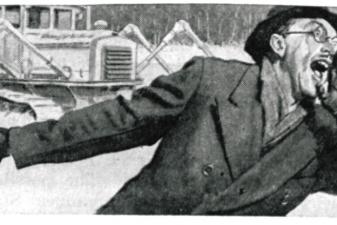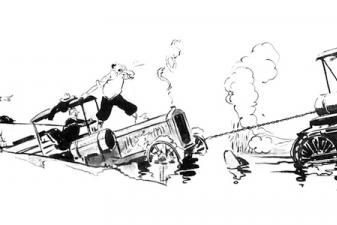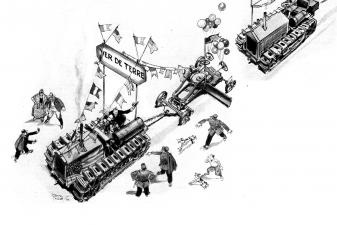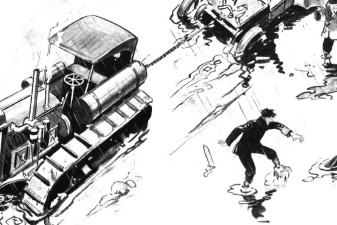Botts Goes to War: Blitzkreig at Boxwood Manor

In Botts Goes to War, the fifth volume in the Alexander Botts and the Earthworm Tractor series, the saga continues for our hero who has resigned from his post as traveling tractor salesman to take up arms as a US Army Captain. In this excerpt, Botts uses his quick thinking to save his former boss from a sticky situation. Start your Botts adventure with Botts Begins or purchase volumes 1-5 as a set! This excerpt is paired with period illustrations that do not appear in the final book.
To: Mr. Gilbert Henderson, President, Earthworm Tractor Company, Earthworm City, Illinois.
From: Alexander Botts, Captain, 999th Tank Battalion, U.S.A.
Date: Monday, October 13, 1941.
Subject: You are in a worse hole than you think, but I am going to get you out.
Although I am now on leave from my job as sales manager of the Earthworm Tractor Company, and am devoting myself to serving my country as an officer in the United States Army, I still retain a certain interest in the affairs of the company. Consequently, when I arrived in Washington this morning, I called at the Earthworm branch office—where I received some rather disturbing news.
The local manager informed me that (1) a certain Mr. Alvin Falkland, an official on the Army-Navy Munitions Board, has recently blocked all deliveries of Earthworm Ordnance Equipment—apparently because of his personal animosity to you, (2) instead of dealing with this situation, you have gone off to Earthworm City for a conference or something, and (3) before you left, you rented, on behalf of the Earthworm Tractor Company, and for no good reason, a luxurious country estate in Virginia, known as Boxwood Manor.
My reaction to the above is a distinct feeling that you have maneuvered yourself into a very precarious position. Last night I heard this Mr. Alvin Falkland making a patriotic speech on the radio. In the course of his remarks, he called upon all good citizens to practice the most rigid economy in their personal affairs. He said that he himself had recently moved into a small and inexpensive apartment here in Washington so that he could devote as much of his income as possible to the purchase of defense bonds. And he condemned, in no uncertain terms, all citizens who, in this period of crisis, persist in wasting money on useless luxuries.
In view of these remarks, it is obvious that if Mr. Alvin Falkland ever hears of your extravagance in renting this palatial country estate, he will set you down as little better than a traitor to your country. And you will have lost all chance of getting into his good graces, which would seem to be necessary if you are to prevail on him to permit the company to resume its vitally important production. Your only hope, as I see it, would be to prove to him that you had acquired this expensive property for some patriotic purpose. And I am very happy to announce, therefore, that I am going to help you out by arranging to use your property in as patriotic a manner as could well be imagined.
It happens that I have recently been relieved from my inspector’s job in the Ordnance Department, and assigned to duty with the 999th Tank Battalion—a splendid organization of over seven hundred officers and men, equipped with fifty-four medium tanks and a large assortment of trucks and other vehicles. The battalion is now making a march from North Carolina to Fort Devens, Massachusetts. And I have been given the job of reconnaissance officer—the advance agent who goes ahead to work out the route of march and arrange for overnight accommodations.
An average reconnaissance officer, representing an average military organization, is usually content if he can rent some field where the men may camp. But I am not an average reconnaissance officer. And I represent an unusually high-grade outfit, for which the best is none too good. When the battalion comes through Washington, therefore, instead of merely renting a field, I have decided to get a mansion for nothing. Using my authority as a representative of the company, and acting in my capacity as sales manager on leave, I will contact the caretaker at Boxwood Manor, and give myself permission, as reconnaissance officer of the tank battalion, to quarter my troops at the estate over the approaching weekend—parking the tanks and other vehicles in the fields, and billeting the men in the manor house and outbuildings.
This will be a great treat for the men, and it should give to you, Henderson, a wonderful talking point in your efforts to ingratiate yourself with this Mr. Falkland. If he should object to your extravagance, in renting this luxurious estate, you can now point out, with complete truth, that you are using it in a most praiseworthy and patriotic manner.
If you have any suggestions for adding to the comfort of the men while they are guests at Boxwood Manor, you may address me here in care of the Washington dealer.
Most sincerely,
Captain Alexander Botts,
999th Tank Battalion.
–
TELEGRAM
EARTHWORM CITY ILL OCT 15 1941
CAPT ALEXANDER BOTTS
EARTHWORM TRACTOR BRANCH OFFICE
WASHINGTON DC
YOUR LETTER IS RECEIVED STOP YOU HAVE NO AUTHORITY TO ACT FOR EARTHWORM COMPANY STOP YOUR PLAN IS CRAZY STOP TROOPS ABSOLUTELY MUST NOT BE QUARTERED AT BOXWOOD MANOR STOP LETTER FOLLOWS
GILBERT HENDERSON
PRESIDENT EARTHWORM TRACTOR COMPANY
–
Earthworm Tractor Company
Earthworm City, Illinois
Office of the President
Wednesday, October 15, 1941.
Captain Alexander Botts,
Earthworm Tractor Company,
Branch Office,
Washington, D.C.
DEAR BOTTS: I trust that by this time you have received my telegram and acted accordingly. If you had actually led your soldiers into Boxwood Manor, you would have completely ruined all my plans for getting favorable consideration from Mr. Falkland—who is an unusually difficult person to deal with. He is both weak and stubborn. I hear that he is badly henpecked by a disagreeable and domineering wife. And he apparently tries to make up for this by acting as an unreasonable martinet in his official duties.
He recently sent one of our transmission gears to a chemical laboratory, received a report that the content of nickel was 2.98 percent, and promptly held up the entire production of our factory on the ground that the specifications call for a three percent nickel content.
All my arguments were of no avail. I brought in government metallurgists who testified that the percentage of nickel was well within the allowable tolerance. I produced tests showing that our gears greatly exceeded the contract requirements in strength, hardness, and everything else. I got nowhere.
I then discovered that Mr. Falkand, because of his woefully inefficient management of the estate left him by his father, was in serious financial difficulties. And it was with the idea of helping him out that I rented Boxwood Manor, which is his property. As long as Mr. Falkland is explaining his move from the Manor to a small apartment in Washington as being due to patriotic reasons, rather than to the necessity of paying off his back bills, I have kept the renting transaction confidential.
Immediately after completing the deal, I was called to Earthworm City on urgent business, but on my return to Washington next week, I expect to start working on Mr. Falkland with every hope that I can iron out the present serious interruption of our production schedule.
In the meantime, it is essential that you steer clear of Boxwood Manor, which is the apple of Mr. Falkland’s eye. It is one of the most carefully and painfully manicured places I have ever seen. Every flower is accurately placed. Every twig on every bush is trained so that it conforms to a stiff and precise plan. And the manor house is crammed with expensive brica-brac and objets d’art. The entire place, in short, is the perfect expression of the same meticulous mind which objects to a difference of .02 percent in the nickel content of a gear.
Obviously, if you had arrived with a fleet of tanks on those exquisitely manicured lawns, and had then led your mob of irresponsible roughnecks into the sacred halls of Boxwood Manor, the results would have been ghastly. I can only thank heaven that I heard about your incredible plans in time to stop them.
Yours,
Gilbert Henderson,
President, Earthworm Tractor Company.
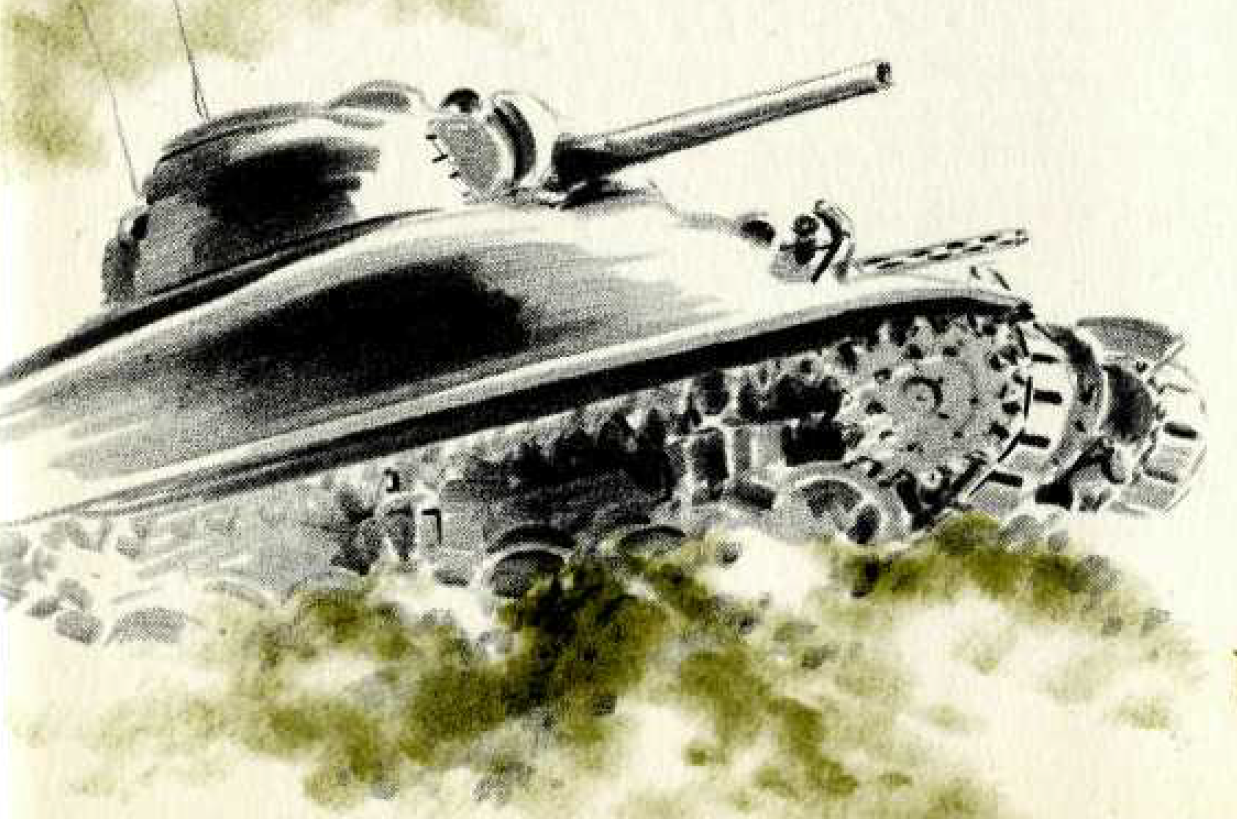
–
Boxwood Manor,
Dandridge, Virginia.
To: Mr. Gilbert Henderson, President, Earthworm
Tractor Company, Earthworm City, Illinois.
From: Alexander Botts, Captain, 999th Tank Battalion, U.S.A.
Date: Friday, October 17, 1941.
Subject: Having wonderful time. Wish you were here.
Your telegram, consisting as it did of a mere peremptory order without any supporting reasons, was so unconvincing that I decided not to pay any attention to it. And your letter, just received, has arrived too late. The army has already taken possession of Boxwood Manor. But I can assure you that you have no cause for worry.
As a matter of fact, you ought to thank me for rescuing you from a very compromising position. If it had become known that you had rented this place for no real reason, except to cause a flow of money in the direction of a public official from whom you are soliciting favors, the whole affair would have savored so strongly of bribery and corruption that a hideous scandal could hardly have been averted. However, now that I have provided a reasonable, not to say patriotic, use for the property, you have a completely plausible defense in case anyone tries to ship you off to some quiet federal penitentiary.
In view of the above, it would have been worthwhile to bring the army here even at the risk of considerable damage to the property. Fortunately, however, I am able to assure you that there is not the slightest danger of any damage whatsoever.
When you speak of “a fleet of tanks on those exquisitely manicured lawns,” you are just plain silly. The tanks and other vehicles are parked where they can do no harm in a meadow across the main highway from the Manor house.
When you speak of my leading my “mob of irresponsible roughnecks into the sacred halls of Boxwood Manor,” you are worse than silly, you are insulting. The 999th Tank Battalion is not a mob; it is an orderly and well disciplined military organization. The members are not irresponsible and they are not roughnecks. They are a carefully selected group of high-grade experts. Most of the tank drivers are former Earthworm operators who have spent many years under the refining influence of the tractor business. Other members of the outfit are radio experts, master mechanics, and members of similar cultural professions—not a bum in a tank load.
When we moved into the Manor, early this afternoon, I had no fears regarding the behavior of the personnel. As billeting officer, I had arranged to put the officers on the upper floors of the Manor house, placing the Colonel in a pink and lavender boudoir, and distributing the other officers, with their bedding rolls, through the various bedrooms. The enlisted men of one of the companies were assigned to the grand ballroom, and the spacious hallways downstairs, while the rest were quartered in the huge barns and stables—the latter having been emptied of all horses and other livestock when Mr. Falkland leased the place to you.
While we were getting settled, the caretaker fluttered about with considerable apprehension, while the Colonel strode hither and thither with watchful eye to see that nothing went amiss. It soon appeared, however, that neither of them had any cause for worry.
The men in the barns and stables were acting in a genteel but completely normal manner. And the only trouble was that the men in the Manor house were over-inhibited. After looking at the polished floor, most of them, entirely on their own initiative, removed their shoes. They tip-toed about in their stocking feet. They spoke in whispers. I actually heard one of the privates politely remonstrating with his own first-sergeant because a few grains of sand from our previous camp ground had trickled out of the first-sergeant’s bedding roll. The bric-a-brac and the objets d’art were as safe as if they had been in glass cases at a museum. Nobody touched anything. It was obvious that the soldiers would do nothing to spoil in any way the highly cultured atmosphere of Boxwood Manor. Quite the contrary. The highly cultured atmosphere of Boxwood Manor was quite obviously spoiling the happiness and good spirits of the army.
I decided that this would never do. Accordingly, about the middle of the afternoon I drove over to the neighboring small town of Dandridge with the idea of arranging a little excitement for the boys. And I am happy to say that I was very successful. As soon as the inhabitants heard that a group of our brave soldiers were in the vicinity, they rallied around with the greatest enthusiasm and promised to do everything they could in the way of entertainment. There will be a garden party at the Manor tomorrow afternoon, sponsored by all the civic organizations of the town of Dandridge. The president of the Women’s Club is lining up all of the best cooks among the ladies to provide refreshments. The proprietor of the local beer parlor is bringing out his jukebox, which will be adjusted to play without dropping in any nickels, so that we can have free music for dancing in the great ballroom. I have even provided a large group of dance partners—the entire enrollment of Miss Twombly’s exclusive finishing school for young ladies. This is a notable triumph; when I first approached Miss Twombly she was completely horrified at the idea. However, I gave her a long lecture, pointing out that it was the patriotic duty of all of us to do what we could towards making life more agreeable for the brave young heroes who are devoting themselves so unselfishly to our national defense. And she finally made elaborate arrangements for her precious charges to attend our party—convoyed by an unusually formidable fleet of chaperones.
On my return to Boxwood Manor, I arrived in the meadow where our tanks were parked just in time to witness a very amusing little incident. It appears that a young farmhand who lives a short distance down the road had become so thrilled and excited at the sight of our tanks that he wanted to drive one. Having failed to get permission from the sergeant in charge, he had bided his time, surreptitiously crawled into the driver’s seat, started the motor, and was just starting to drive off when he was overpowered and chased home by two of our mechanics.
This incident has caused us to post extra guards so there will be no danger of unauthorized tank driving at tomorrow’s party—which bids fair to be an unusually grand glorious affair.
My only regret is that you, Henderson, cannot be present to observe the splendid use to which Boxwood Manor is being put. In your absence, I am very seriously considering the advisability of inviting Mr. Falkland out here. It should give him a real thrill to see how his place is contributing to our national defense effort.
Most sincerely yours,
Captain Alexander Botts,
999th Tank Battalion.
–
TELEGRAM
EARTHWORM CITY ILL OCT 19 1941
CAPT ALEXANDER BOTTS
BOXWOOD MANOR
DANDRIDGE VA
MR FALKLAND ABSOLUTELY MUST BE KEPT AWAY FROM BOXWOOD MANOR UNTIL THE ARMY HAS DEPARTED AND THE PLACE HAS BEEN CLEANED UP STOP I DONT CARE IF YOUR YOUNG MEN ARE REFINED AND CULTURED STOP SO ARE COLLEGE STUDENTS STOP BUT ANY GROUP OF YOUNG MEN ARE PRONE TO HORSEPLAY AND SKYLARKING STOP IN A PLACE LIKE BOXWOOD MANOR THIS IS SURE TO CAUSE DAMAGE WHICH WOULD ALMOST CERTAINLY THROW MR FALKLAND INTO A NERVOUS FRENZY STOP HE MUST BE KEPT AWAY
GILBERT HENDERSON
PRESIDENT EARTHWORM TRACTOR COMPANY
–
Boxwood Manor,
Dandridge, Virginia.
To: Mr. Gilbert Henderson, President, Earthworm Tractor Company, Earthworm City, Illinois.
From: Alexander Botts, Captain, 999th Tank Battalion, U.S.A.
Date: Sunday, October 19, 1941.
Subject: Don’t believe everything you see in the newspapers.
Your telegram has just arrived—too late as usual. I had already called up Mr. Falkland yesterday morning and invited him to come out. We held our party yesterday afternoon, and Mr. Falkland arrived amid scenes of the wildest excitement. There was so much uproar and destruction that an account of what happened may possibly get into the newspapers all over the country. If you should run across any such account, I hope you will not be unduly alarmed. After all, the house is still standing. The broken glass, etc., has all been swept up, and the heavier wreckage will be cleared away within a few days. Furthermore, nothing that happened is in any way your fault, or my fault, so no blame can rightly be attached to either of us—as you will understand when I explain the circumstances. . .
Check out the related books linked below for more of Alexander Botts.


